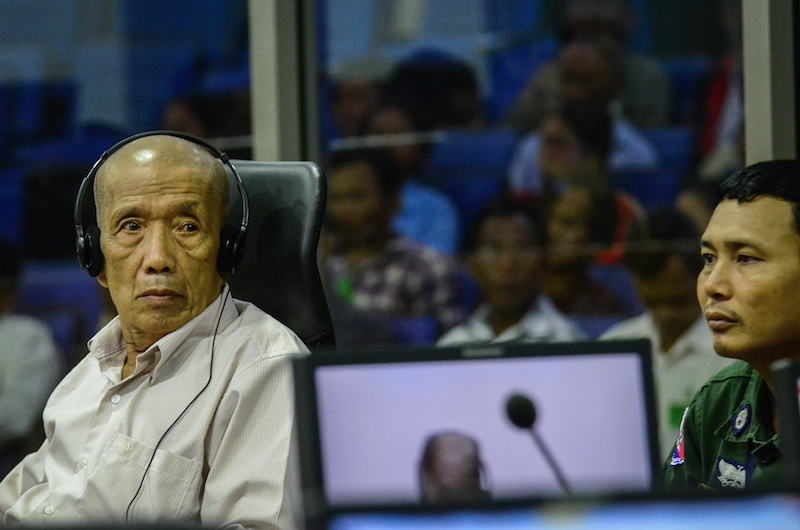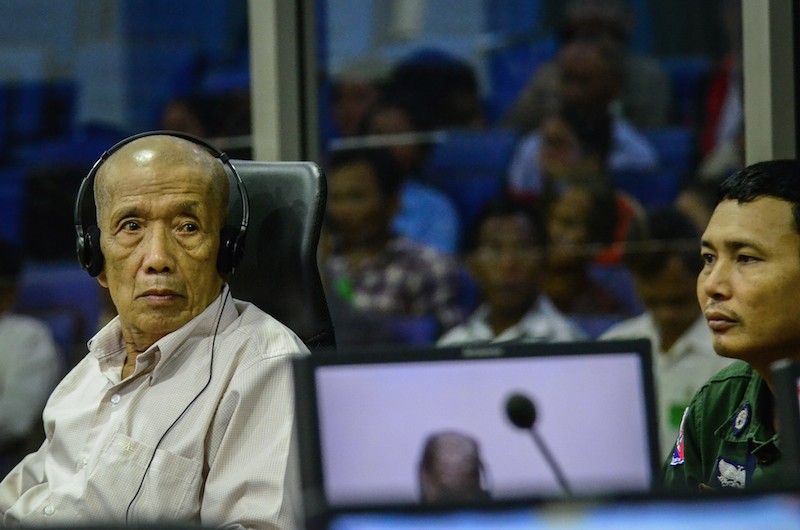Kaing Guek Eav, better known by his revolutionary alias Duch, told the Khmer Rouge tribunal on Thursday that he had no knowledge of plans to wage coup d’etats against Pol Pot’s inner circle and branded the theories “surreal.”
Appearing in his penultimate day of testimony, the former chief of the S-21 prison—where more than 15,000 people are thought to have been sent to their deaths—was grilled by Nuon Chea’s defense lawyer Victor Koppe on his knowledge of plans to overthrow the party center.
Faced with testimony and interviews with 10 former combatants from Division 310 who claimed to have been involved in plans to seize Pochentong Airport and Radio Phnom Penh in 1977, Duch called them “imaginative.”
“I did not hear of this plan to attack at all while I was at S-21. Regarding the plans to get hold of the radio station near Wat Phnom, I was not aware of such plans,” Duch said.
“I believe this statement is rather imaginative. It is surreal. The content is so surreal,” he added.
As Duch dismissed testimony regarding planned rebellions—which is a core element of the Nuon Chea defense—the Dutch lawyer became irritated and accused the former prison chief of sabotaging his client’s case.
“Let’s see if you can sabotage this one as well,” Mr. Koppe said, before launching into questions about alleged coup plans in the Northwest Zone.
Following an objection from the prosecution, and advice from Trial Chamber President Nil Nonn to “behave appropriately,” Mr. Koppe accused him of being complicit in the perceived sabotage.
“Sabotaging with your assistance if I might add, Mr. President,” Mr. Koppe replied, at which point Judge Claudia Fenz ordered him to “stop it.”
“No, I won’t stop it! It’s a travesty here—it’s incredible,” Mr. Koppe, who has recently been referred to the Amsterdam Bar Association twice for his comments inside and outside of the courtroom, shot back at the judge.
Asked to elaborate on the Khmer Rouge’s “principle of secrecy” that he had mentioned in previous testimony, Duch said that the Cambodian communists had become fearful in the 1960s after learning of the anti-communist massacres led by former Indonesian president Suharto.
“The situation happened in Indonesia and it had impacts on communist thinking at the time. They were thinking that the Americans would come to engage in Cambodia, and the [theory of] secrecy was that if the information leaked, we would die,” Duch said.
“In the 1960s, there were four principles in relation to secrecy: Do not know, do not say, do not hear and do not see,” he said.
Duch—who in 2010 became the first Khmer Rouge official to be found guilty of crimes against humanity and is testifying in the current case against Nuon Chea and Khieu Samphan—will conclude his 12th and final day of testimony on Monday.





